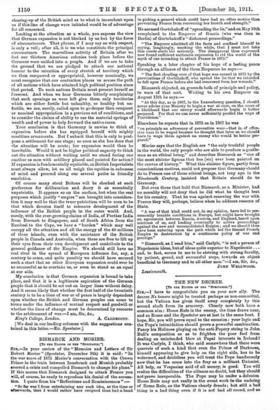BISMARCK AND MORIER. [To TER ED1TOB 01 TER "SpEorAroo."] Sin, — In
your review of the " Memoirs and Letters of Sir Robert Atorier " (Spectator, December 9th) it is said: "In the war scare of 1875 Alorier's conversation with the Crown
Prince in the train between Innsbruck and Munich probably averted a crisis and compelled Bismarck to change his plans."
If this means that Bismarck designed to attack France you will, of course, be ready to reproduce his denial of the accusa- tion. I quote from his "Reflections and Reminiscences":- " So far was I from entertaining any such idea, at the time or afterwards, that I would rather have resigned than had a hand
in picking a quarrel which could have had no other motive than preventing France from recovering her breath and strength."
He accused Gortchakoff of "spreading the lie," and on May 10th complained to the Emperor of Russia (who was then in Berlin) of Gortchakoff's " dishonest proceedings."
"The Emperor admitted all the facts and confined himself to saying, laughingly, smoking the while, that I must not take this vanite senile too seriously. The disapproval thus expressed now found sufficient authentic expression to rid the world of the myth of our intending to attack France in 1875."
Speaking in a later chapter of his hope of a lasting peace through an alliance of the three Emperors he says :—
" The first clouding over of that hope was caused in 1975 by the provocations of Gortchakoff, who spread the lie that we intended to fall upon France before she had recovered from her wounds."
Bismarck objected, on grounds both of principle and policy, to wars of that sort. Writing to his own Emperor on August 13th he says :--
"At this day, as in 1867, in the Luxembourg question, I should never advise your Majesty to begin a war at once, on the score of a likelihood that our enemy would afterwards begin it better prepared. For that we can never sufficiently predict the ways of Providence."
Elsewhere be repeats that in 1875 as in 1867 he was
"on principle an adversary of preventive wars—that is, of offen- sive wars to be waged because we thought that later on we should have to wage them against an enemy who would be better pre- pared."
Monier says that the English are "the only truthful people in the world, the only people who are able to produce a gentle- man as an ethical being," and describes Bismarck as " one of
the most sinister figures that has [sic] ever been painted on the canvas of history." What this sinister figure, partly from conscientious motives, could not propose that Germany should do to France one of those ethical beings, not long ago in the Nineteenth Century, insisted that Britain should do to
Germany.
But even those that hold that Bismarck, as a Minister, had no morality will not deny that he did what he thought best for his country. That he was against renewing the war with France they will, perhaps, believe when be adduces reasons of State.
"A war of that kind could not, in my opinion, have led to per.. manently tenable conditions in Europe, but might have brought an agreement between Russia, Austria, and England, based upon mistrust of us, and leading eventually to active proceedings against the new and unconsolidated Empire ; and we should thus have been entering upon the path which led the Second French Empire to destruction by a continuous policy of war and prestige."
" Bismarck, as I read him," said Carlyle, " is not a person of
Napoleonic ideas, but of ideas quite superior to Napoleonic ... and, in fact, seems to me to be striving with strong faculty, by patient, grand, and successful steps, towards an object beneficial to Germany and to all other men."—I am, Sir, &c., Lossiemouth. Joni/ WELLWOOD.






































 Previous page
Previous page